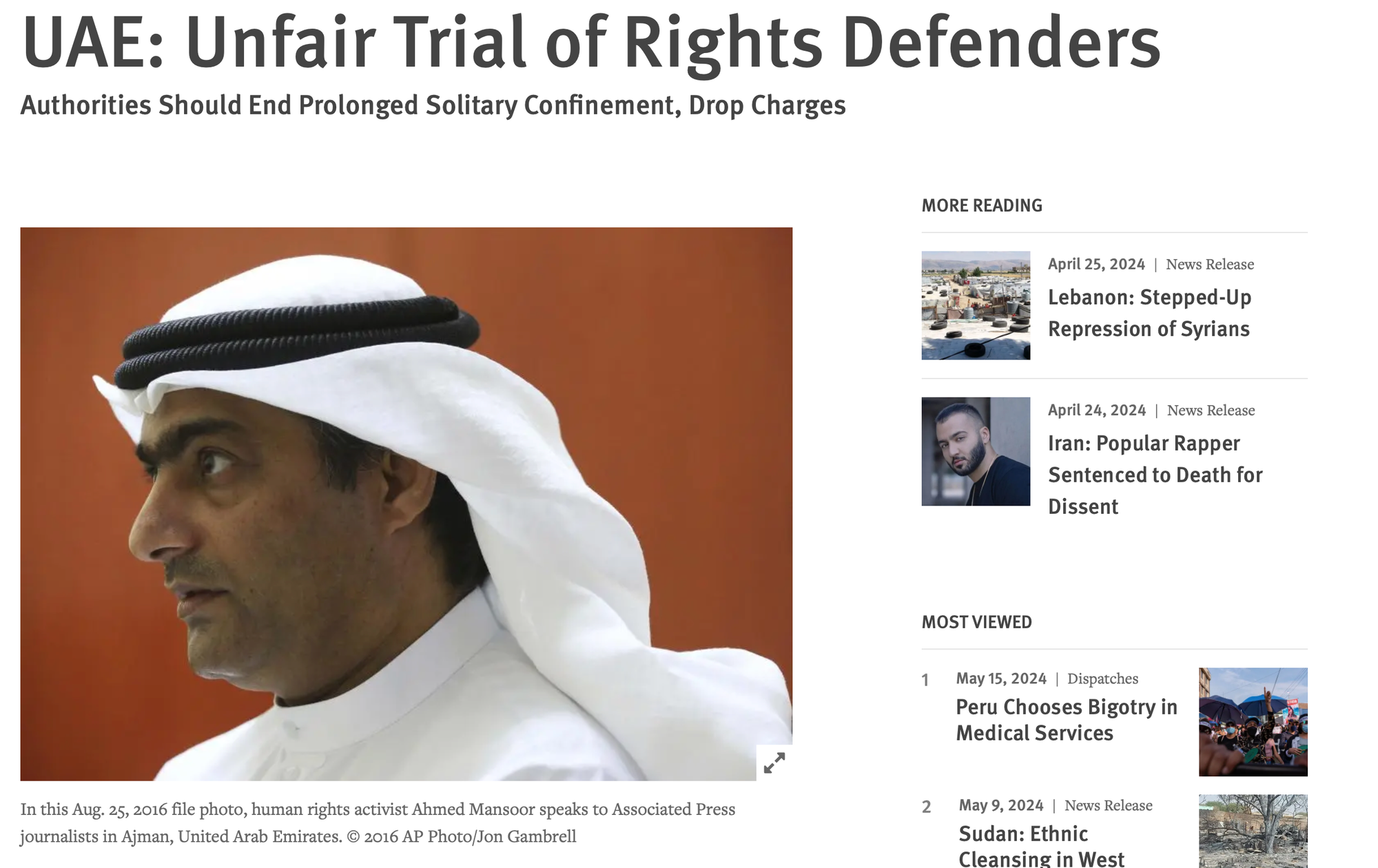
United Arab Emirates Rejects UN Concerns on Mass Trial as Death Penalty Verdicts Feared
The United Arab Emirates, which brought fresh charges against dozens of previously-convicted critics while hosting the COP28 climate conference with great fanfare, is defying UN experts who have denounced the “spurious” terrorism charges, The Geneva Observer has learned.
The UAE, like Saudi Arabia a wealthy Gulf monarchy and OPEC (Organization of the Petroleum Exporting Countries) heavyweight, has been seeking to burnish its international image despite its poor human rights record. But a secretive mass trial currently held in booming Abu Dhabi has undercut its greenwashing and “soft power” campaign, revealing a darker side of the emirate where the rule of law remains under assault, activists say.
“It is very hard to get information on the detainees because most of them are detained incommunicado. The hearings are held in secret, and they don’t have adequate legal representation,” Falah Sayed of the MENA (Middle East and North Africa) Rights Group told me this week. Such “repression of civil society in the context of an international conference” was highly concerning, she said.
“The judgment should come out in June but it is not confirmed,” Sayed said, noting that there has also been a “complete media blackout.”
Use of Torture
Ben Saul, UN special rapporteur on the promotion and protection of human rights and fundamental freedoms while countering terrorism, sent a joint letter in January on behalf of a dozen UN experts, voicing concerns about the new charges brought against 84 of the original 133 defendants indicted in 2011 for demanding democratic reforms.
The UN experts expressed concern about the “alleged irregularities in the latest trial” in Abu Dhabi Federal Appeal Court, including a lack of fair trial guarantees and the use of torture to extract forced confessions. If convicted, some of the accused could face the death penalty or life imprisonment.
“It is a terrible example of the misuse of counter-terrorism measures against civil society and a crackdown on civic space,” Saul told a debate at the Swiss Press Club in Geneva in March. The latest prosecutions had had a “chilling effect” on dissent in the international trading hub, he added.
“Those on trial include prominent activists and dissidents already serving long prison sentences based on abusive charges,” the New York-based group Human Rights Watch said last month. “This unfair mass trial is a farce, and the allegations of torture and gross fair trial violations lay bare the UAE’s hollow rule of law and utter lack of access to justice.”
The UAE government, in an initial written response in March which coincided with an ongoing Human Rights Council session, told the UN experts that it needed an additional month to conduct “a full investigation” into their query.
Denial of Allegations
In a subsequent reply being reported here for the first time, in an April 8 letter to the UN experts, the government said: “The UAE respectfully denies the allegations and premature conclusions contained in the Joint Communication,” adding, “The judiciary in the UAE is independent and is protected from any form of interference by other powers," and “The UAE recognizes and protects the fair trial rights of all individuals under its jurisdiction.” The concerns voiced by the UN investigators on freedom of expression were “unfounded and misguided,” it insisted.
The UAE letter, which failed to address any individual cases highlighted in the UN letter, was “very generic and broad,” a UN source said.
Volker Turk, UN High Commissioner for Human Rights, also raised the UAE case in his global update delivered to the Human Rights Council in early March. “In the United Arab Emirates, another mass trial is underway based on counter-terrorism legislation that contravenes human rights law. In December, new charges were brought against 84 people, including human rights defenders, journalists and others who were already in prison. Several were nearing the end of their sentence or have been arbitrarily held in detention after completion of their sentence,” he told the forum, whose current members include the UAE.
“I remain concerned about broader patterns of suppression of dissent and the civic space in the country, and I urge the Government to review domestic laws in line with international human rights recommendations,” Turk said.
Solitary Confinement
As concerns mount and the verdicts approach, the cases of some of the individual Emirati defendants may be cited in the annual report on reprisals which Turk’s office is due to issue in June, UN sources told The Geneva Observer.
Ahmed Al-Nuaimi is an education specialist who was convicted in absentia to 15 years in prison in 2013 as part of the original group of defendants. His brother Khalid, who competed his lengthy prison term last October, is still detained under the 2014 counter-terrorism law. Khalid’s detention was declared unlawful by the UN Working Group on Arbitrary Detention last year.
“It is hard to get any information from the government, they don’t answer any questions about detainees,” Ahmed Al-Nuiami, who now lives in Britain, told the Swiss Press Club event. “We know that all detainees [have been] in solitary confinement for a long time, some for more than two years now.”
By Stephanie Nebehay
